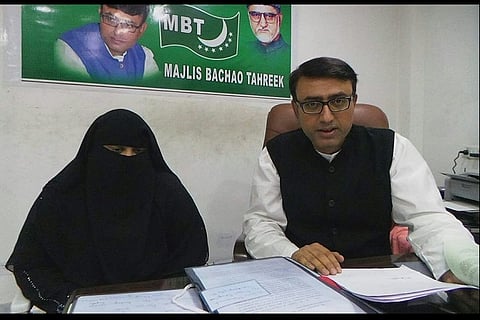

35-year-old Noorjahan Begum lived a difficult life in Kishanbagh, Hyderabad. Her husband used to do odd jobs, but it was just not enough for the family of five to survive.
It was with the desire to help put food on their plates and to support their children’s education that in September last year, Noorjahan got in touch with a travel agent who offered her a job in Saudi Arabia as a domestic help. She was promised between 20,000 to 22,000 rupees monthly salary – 1,200 Riyal – with food, medical expenses and accommodation included.
Though Noorjahan had never worked before, she decided to go to a foreign land hoping to find some financial stability. She had apprehensions, but she did not know that her trip to Saudi would actually turn into the most terrifying experience she had.
“There was a time when I thought I would die here. I had no way of contacting my family or seeking help. I would see myself breathing my last here, all alone,” recalls Noorjahan, who was brought back to Hyderabad around November 18.
It began when the agent told Noorjahan that she didn’t need to worry about not clearing the medical tests to obtain the visa. Noorjahan had been diagnosed with a thyroid problem as well as high blood sugar about five years ago. She says that the agent told her that they could bribe the officials to get the required medical clearance. “I didn’t give him the money, but he got it somehow” she says.
She was then flown to Medina via Dubai, as opposed to being promised a direct flight from Hyderabad. Once there, she was taken to her kafeel (employer), in whose house she was made to work for long hours with one meal a day.
“He would give me a piece of bun with some paste on it in the morning. He would speak in Arabic or English, neither of which I know. I would try to point to food so that they would give it to me too, but they never did. I wasn’t even given a soap bar or toothpaste,” Noorjahan narrates.
She adds that they would give her chocolates and some sweets and expect her to make a meal out of them. “I had high blood sugar but I was desperate with hunger. I had no choice but to make do,” she laments.
Within nine days of being there, Noorjahan’s health worsened. She could not speak to her husband because she didn’t have a phone and the family who she worked for wouldn’t give her medicines she needed. Somehow she managed to communicate to them that she was sick and wanted to come back to India.
A man in the house told her that they would take her to the Jeddah airport from where she could take a flight back home. He took her in a car and then left her in the locked vehicle for almost two hours as he went to speak to the agents there. Being stuck there with no food or water in Jeddah heat and not knowing what was happening to her is a memory that still haunts Noorjahan.
The agents at the Jeddah made her speak to agent in Hyderabad who demanded a few lakh rupees. Noorjahan said that she would pay him the money in installments, but he said she did not have the status to even give him Rs 10,000 and hung up.
Noorjahan was then taken to a second kafeel. “When I reached there, there was a pile of unwashed utensils I was told to wash. I think it was 9-10 days worth of utensils because it took me six hours to wash them,” she says.
The situation did not get any better here, with the family in the house turning a blind eye towards her pleas for food and medicine. As Noorjahan’s health worsened, her ability to work went down. She was sent to a third kafeel after two days because she could no longer work. The third one kept her for a day and sent her to a fourth.
Noorjahan says that the fourth kafeel had a huge family with 9-10 children. Here she spent over a month. And while they gave her food, she did not get the medical attention she needed. “I had spoken to my husband only once since I came there. There was a point where I was so sick that I could not speak. I thought I would die,” she whispers.
It was in the beginning of November that Noorjahan’s husband reached out to Majlis Bachao Tahreek (MBT) leader Amjed Ullah Khan, who contacted city police and a complaint was lodged at Bahadurpura Police Station. In a Facebook post Khan put up on Friday, he writes the matter was also escalated to External Affairs Minister Sushma Swaraj, KT Rama Rao and the Indian Embassy in Jeddah.
“After much pressure and team work she was allowed to leave KSA and returned safely Hyderabad,” he writes.
Though Noorjahan is back home safely, she is still recovering from the toll the experience took on her health. Their financial crisis has resulted in their eldest son being rusticated from college due to non-payment of fees. He works now, along with his father, to support the family.
“If I hadn’t gone, I wouldn’t have fallen so sick. But even if I get better, I don’t want to work now. I will survive on whatever we can manage,” Noorjahan says.